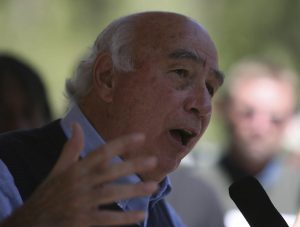 The St. Clairsville, Ohio-based Murray Energy Corporation is planning for a massive number of layoffs to occur in September. The company says it issued the notices for its operations in Ohio, West Virginia, Illinois, Kentucky, Utah and Pennsylvania. According to the warning, as many as 82 percent of the company’s workers, or about 4,400 employees, could lose their jobs. Murray Energy is currently the largest privately held coal company in the US.
The St. Clairsville, Ohio-based Murray Energy Corporation is planning for a massive number of layoffs to occur in September. The company says it issued the notices for its operations in Ohio, West Virginia, Illinois, Kentucky, Utah and Pennsylvania. According to the warning, as many as 82 percent of the company’s workers, or about 4,400 employees, could lose their jobs. Murray Energy is currently the largest privately held coal company in the US.
Robert Murray, the controlling owner of Murray, said in a statement that the layoffs are “due to the ongoing destruction of the United States coal industry by President Barack Obama, and his supporters, and the increased utilization of natural gas to generate electricity.” Murray said earlier this year that all his mines are running on reduced schedules because of the slumping market. Murray and other coal operators are currently involved in contract negotiations with the United Mine Workers of America, whose members rejected a proposed contract earlier this week.
The coal industry has been in decline for decades. In 1985, the industry employed 177,000 people. Today, that number has fallen to about 56,000 workers. In 2007, coal produced roughly 50 percent of the electricity used across the country. Today, that number is about 33 percent.
The industry has also been hurt by its own mistakes. Many companies in the industry loaded up on debt to fund deals as Chinese demand for steel-making coal surged. That was just before demand tanked. Almost all of America’s biggest coal producers have declared bankruptcy in the past 18 months, including Peabody Energy, Arch Coal, Alpha Natural Resources, and Patriot Coal.
President Barack Obama’s administration has set out an ambitious agenda for increased reliance on renewable fuels called the Clean Power Plan, released last August. The plan calls for reducing the country’s greenhouse gas emissions by 32 percent by 2030. The plan recommends a switch from coal to natural-gas-powered plants and put a three-year moratorium on sales of federal coal reserves. The Supreme Court ruled in February to stay the plan pending judicial review.
